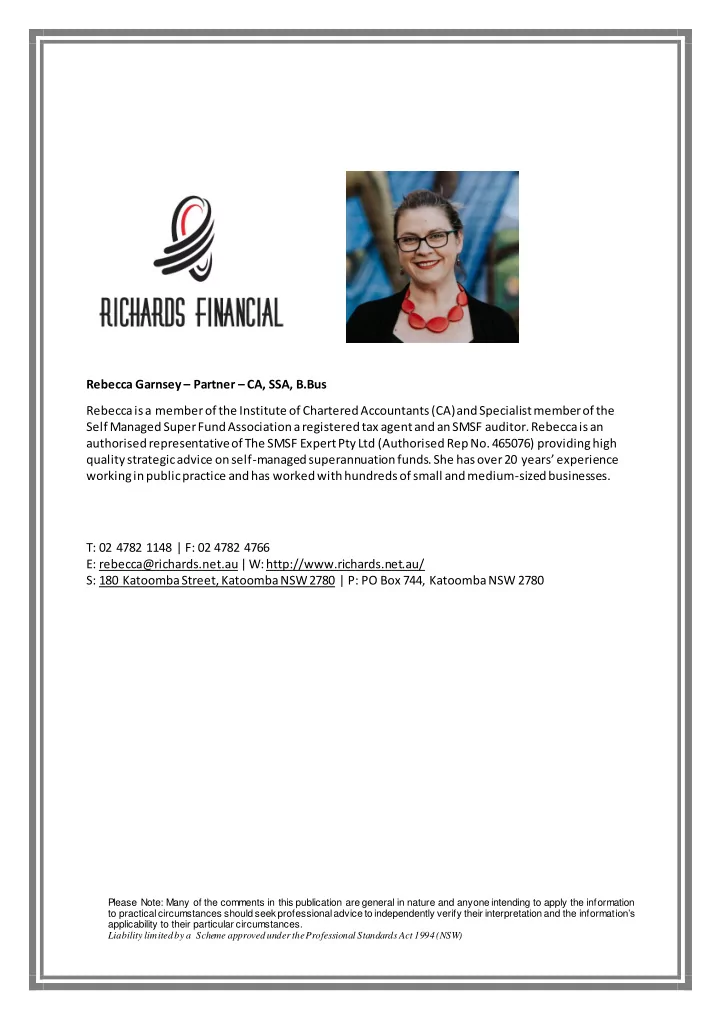

Rebecca Garnsey – Partner – CA, SSA, B.Bus Rebecca is a member of the Institute of Chartered Accountants (CA) and Specialist member of the Self Managed Super Fund Association a registered tax agent and an SMSF auditor. Rebecca is an authorised representative of The SMSF Expert Pty Ltd (Authorised Rep No. 465076) providing high quality strategic advice on self-managed superannuation funds. She has over 20 years’ experience working in public practice and has worked with hundreds of small and medium-sized businesses. T: 02 4782 1148 | F: 02 4782 4766 E: rebecca@richards.net.au | W: http://www.richards.net.au/ S: 180 Katoomba Street, Katoomba NSW 2780 | P: PO Box 744, Katoomba NSW 2780 Please Note: Many of the comments in this publication are general in nature and anyone intending to apply the information to practical circumstances should seek professional advice to independently verify their interpretation and the informat ion’s applicability to their particular circumstances. Liability limited by a Scheme approved under the Professional Standards Act 1994 (NSW)
General Advice Disclaimer This presentation (‘Presentation’) has been produced by Richards Financial Services Pty Ltd and has been prepared for informational and discussion purposes only. The information provided in this document is of a general nature and has been prepared without taking into account your objectives, circumstances, financial situation or particular needs. This Presentation does not constitute personal advice. This Presentation has been prepared by us in the ordinary course of our profession. In providing this Presentation, we are not purporting to act as solicitors or provide legal advice. Appropriate advice should be sought prior to acting on anything contained in this Presentation or implementing any transaction or arrangement that may be referred to in this Presentation. Information contained within this Presentation is based on the relevant law and its interpretations by relevant authorities as it stands at the time the information is provided. Any changes or modifications to the law and/or its interpretation after this time could affect the information we have provided. This Presentation, or any part thereof, must not be distributed, copied, used, or relied on by any person, without our prior written consent. To the maximum extent permitted by law, Richards Financial Services Pty Ltd will not be liable for any loss, damage, liability or claim whatsoever suffered or incurred by any person arising directly or indirectly out of the use or reliance on the information contained within this Presentation. Any trademarks, logos, and service marks contained herein may be the registered and unregistered trademarks of their respective owners. Nothing contained herein should be construed as granting by implication, or otherwise, any license or right to use any trademark displayed without the written permission of the owner. Liability limited by a scheme approved under Professional Standards Legislation Please Note: Many of the comments in this publication are general in nature and anyone intending to apply the information to practical circumstances should seek professional advice to independently verify their interpretation and the informat ion’s applicability to their particular circumstances. Liability limited by a Scheme approved under the Professional Standards Act 1994 (NSW)
RENTAL INCOME AND YOUR TAX RETURN The income that you get from your Airbnb rent will normally be deemed assessable, given that the property is advertised to the public online. The ATO may attempt to argue you’re not charging a commercial rent, particularly if you’re making a loss on your Airbnb venture. Claiming Deductions If you’re a landlord for a rental property with assessable in come, you may be entitled to tax deductions for expenses incurred. These expenses fall into three categories: expenses directly associated with the rented area can be deducted in full expenses related to shared areas need to be apportioned expenses related to the host’s private area only cannot be deducted. Expenses that may be deductible in full include: depreciation of furniture used in the rented room commercial cleaning of the rented area repairs and maintenance food, such as breakfast provisions, made available to the guest professional photography for the listing service fees and commissions charged by Airbnb. Partially deductible expenses Where there are expenses that relate to the entire property, you’ll need to apportion them between the rented area and the area you use privately. This is most often done based on the floor area used for renting compared to the total floor area of the property. Some examples of expenses that relate to the entire property that may be apportioned include: mortgage interest or rent; council rates; utilities; and insurance. Expenses relating to shared areas Expenses that relate to shared areas can be apportioned based on access. So, if the renter and the landlord both have equal access to, say, the lounge and the kitchen, you can deduct 50% of these expenses. Examples of expenses that relate to shared areas only include: depreciation on furniture and appliances located in shared areas (such as sofas, TV’s, kitchen equipment) internet, phone and cable TV costs Claiming losses If rental expenses exceed rental income, you’ll make a loss. The excess of rental expenses over rental income (the loss) can effectively be claimed against your other income such as salary. This is known as negative gearing. The rent charged must be considered to be arm’s length commercial rent – otherwise you cannot claim for negative gearing Where you rent out a whole property, expenses are only deductible where an area of the house is either actually rented out, or available for rent. For example, where a property is available for rent Please Note: Many of the comments in this publication are general in nature and anyone intending to apply the information to practical circumstances should seek professional advice to independently verify their interpretation and the informat ion’s applicability to their particular circumstances. Liability limited by a Scheme approved under the Professional Standards Act 1994 (NSW)
Recommend
More recommend